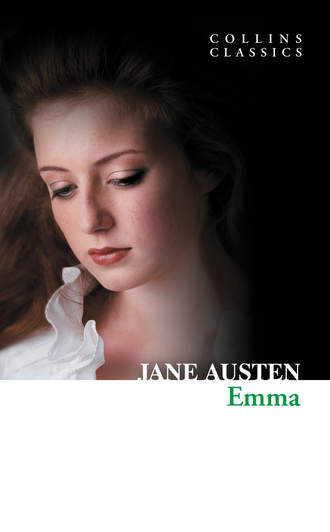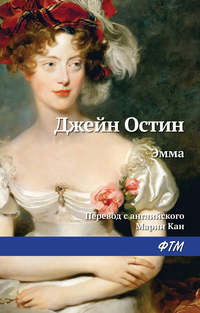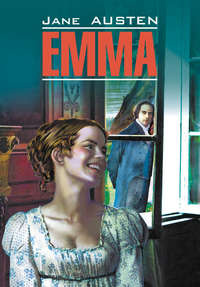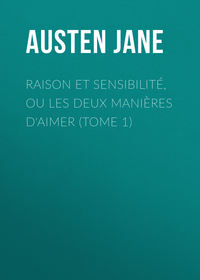
Полная версия
Emma
‘Such sweet lines!’ continued Harriet – ‘these two last! – But how shall I ever be able to return the paper, or say I have found it out? – Oh! Miss Woodhouse, what can we do about that?’
‘Leave it to me. You do nothing. He will be here this evening, I dare say, and then I will give it him back, and some nonsense or other will pass between us, and you shall not be committed. – Your soft eyes shall chuse their own time for beaming. Trust to me.’
‘Oh! Miss Woodhouse, what a pity that I must not write this beautiful charade into my book! I am sure I have not got one half so good.’
‘Leave out the two last lines, and there is no reason why you should not write it into your book.’
‘Oh! but those two lines are’ –
‘– The best of all. Granted; – for private enjoyment; and for private enjoyment keep them. They are not at all the less written you know, because you divide them. The couplet does not cease to be, nor does its meaning change. But take it away, and all appropriation ceases, and a very pretty gallant charade remains, fit for any collection. Depend upon it, he would not like to have his charade slighted, much better than his passion. A poet in love must be encouraged in both capacities, or neither. Give me the book, I will write it down, and then there can be no possible reflection on you.’
Harriet submitted, though her mind could hardly separate the parts, so as to feel quite sure that her friend were not writing down a declaration of love. It seemed too precious an offering for any degree of publicity.
‘I shall never let that book go out of my own hands,’ said she.
‘Very well,’ replied Emma; ‘a most natural feeling; and the longer it lasts, the better I shall be pleased. But here is my father coming: you will not object to my reading the charade to him. It will be giving him so much pleasure! He loves any thing of the sort, and especially any thing that pays woman a compliment. He has the tenderest spirit of gallantry towards us all! – You must let me read it to him.’
Harriet looked grave.
‘My dear Harriet, you must not refine too much upon this charade. – You will betray your feelings improperly, if you are too conscious and too quick, and appear to affix more meaning, or even quite all the meaning which may be affixed to it. Do not be overpowered by such a little tribute of admiration. If he had been anxious for secrecy, he would not have left the paper while I was by; but he rather pushed it towards me than towards you. Do not let us be too solemn on the business. He has encouragement enough to proceed, without our sighing out our souls over this charade.’
‘Oh! no – I hope I shall not be ridiculous about it. Do as you please.’
Mr Woodhouse came in, and very soon led to the subject again, by the recurrence of his very frequent inquiry of ‘Well, my dears, how does your book go on? – Have you got any thing fresh?’
‘Yes, papa; we have something to read you, something quite fresh. A piece of paper was found on the table this morning – (dropt, we suppose, by a fairy) – containing a very pretty charade, and we have just copied it in.’
She read it to him, just as he liked to have any thing read, slowly and distinctly, and two or three times over, with explanations of every part as she proceeded – and he was very much pleased, and, as she had foreseen, especially struck with the complimentary conclusion.
‘Aye, that’s very just, indeed, that’s very properly said. Very true. “Woman, lovely woman.” It is such a pretty charade, my dear, that I can easily guess what fairy brought it. – Nobody could have written so prettily, but you, Emma.’
Emma only nodded, and smiled. – After a little thinking, and a very tender sigh, he added,
‘Ah! it is no difficulty to see who you take after! Your dear mother was so clever at all those things! If I had but her memory! But I can remember nothing; – not even that particular riddle which you have heard me mention; I can only recollect the first stanza; and there are several.
Kitty, a fair but frozen maid,
Kindled a flame I yet deplore,
The hoodwink’d boy I called to aid,
Though of his near approach afraid,
So fatal to my suit before.
And that is all that I can recollect of it – but it is very clever all the way through. But I think, my dear, you said you had got it.’
‘Yes, papa, it is written out in our second page. We copied it from the Elegant Extracts. It was Garrick’s, you know.’
‘Aye, very true. – I wish I could recollect more of it.
Kitty, a fair but frozen maid.
The name makes me think of poor Isabella; for she was very near being christened Catherine after her grandmamma. I hope we shall have her here next week. Have you thought, my dear, where you shall put her – and what room there will be for the children?’
‘Oh! yes – she will have her own room, of course; the room she always has; – and there is the nursery for the children, – just as usual, you know. Why should there be any change?’
‘I do not know, my dear – but it is so long since she was here! – not since last Easter, and then only for a few days. – Mr John Knightley’s being a lawyer is very inconvenient. – Poor Isabella! – she is sadly taken away from us all! – and how sorry she will be when she comes, not to see Miss Taylor here!’
‘She will not be surprized, papa, at least.’
‘I do not know, my dear. I am sure I was very much surprized when I first heard she was going to be married.’
‘We must ask Mr and Mrs Weston to dine with us, while Isabella is here.’
‘Yes, my dear, if there is time. – But – (in a very depressed tone) – she is coming for only one week. There will not be time for any thing.’
‘It is unfortunate that they cannot stay longer – but it seems a case of necessity. Mr John Knightley must be in town again on the 28th, and we ought to be thankful, papa, that we are to have the whole of the time they can give to the country, that two or three days are not to be taken out for the Abbey. Mr Knightley promises to give up his claim this Christmas – though you know it is longer since they were with him, than with us.’
‘It would be very hard, indeed, my dear, if poor Isabella were to be anywhere but at Hartfield.’
Mr Woodhouse could never allow for Mr Knightley’s claims on his brother, or any body’s claims on Isabella, except his own. He sat musing a little while, and then said,
‘But I do not see why poor Isabella should be obliged to go back so soon, though he does. I think, Emma, I shall try and persuade her to stay longer with us. She and the children might stay very well.’
‘Ah! papa – that is what you never have been able to accomplish, and I do not think you ever will. Isabella cannot bear to stay behind her husband.’
This was too true for contradiction. Unwelcome as it was, Mr Woodhouse could only give a submissive sigh; and as Emma saw his spirits affected by the idea of his daughter’s attachment to her husband, she immediately led to such a branch of the subject as must raise them.
‘Harriet must give us as much of her company as she can while my brother and sister are here. I am sure she will be pleased with the children. We are very proud of the children, are not we, papa? I wonder which she will think the handsomest, Henry or John?’
‘Aye, I wonder which she will. Poor little dears, how glad they will be to come. They are very fond of being at Hartfield, Harriet.’
‘I dare say they are, sir. I am sure I do not know who is not.’
‘Henry is a fine boy, but John is very like his mamma. Henry is the eldest, he was named after me, not after his father. John, the second, is named after his father. Some people are surprized, I believe, that the eldest was not, but Isabella would have him called Henry, which I thought very pretty of her. And he is a very clever boy, indeed. They are all remarkably clever; and they have so many pretty ways. They will come and stand by my chair, and say, “Grandpapa, can you give me a bit of string?” and once Henry asked me for a knife, but I told him knives were only made for grandpapas. I think their father is too rough with them very often.’
‘He appears rough to you,’ said Emma, ‘because you are so very gentle yourself; but if you could compare him with other papas, you would not think him rough. He wishes his boys to be active and hardy; and if they misbehave, can give them a sharp word now and then; but he is an affectionate father – certainly Mr John Knightley is an affectionate father. The children are all fond of him.’
‘And then their uncle comes in, and tosses them up to the ceiling in a very frightful way!’
‘But they like it, papa; there is nothing they like so much. It is such enjoyment to them, that if their uncle did not lay down the rule of their taking turns, whichever began would never give way to the other.’
‘Well, I cannot understand it.’
‘That is the case with us all, papa. One half of the world cannot understand the pleasures of the other.’
Later in the morning, and just as the girls were going to separate in preparation for the regular four o’clock dinner, the hero of this inimitable charade walked in again. Harriet turned away; but Emma could receive him with the usual smile, and her quick eye soon discerned in his the consciousness of having made a push – of having thrown a die; and she imagined he was come to see how it might turn up. His ostensible reason, however, was to ask whether Mr Woodhouse’s party could be made up in the evening without him, or whether he should be in the smallest degree necessary at Hartfield. If he were, every thing else must give way; but otherwise his friend Cole had been saying so much about his dining with him – had made such a point of it, that he had promised him conditionally to come.
Emma thanked him, but could not allow of his disappointing his friend on their account; her father was sure of his rubber. He re-urged – she re-declined; and he seemed then about to make his bow, when taking the paper from the table, she returned it –
‘Oh! here is the charade you were so obliging as to leave with us; thank you for the sight of it. We admired it so much, that I have ventured to write it into Miss Smith’s collection. Your friend will not take it amiss I hope. Of course I have not transcribed beyond the first eight lines.’
Mr Elton certainly did not very well know what to say. He looked rather doubtingly – rather confused; said something about ‘honour,’ – glanced at Emma and at Harriet, and then seeing the book open on the table, took it up, and examined it very attentively. With the view of passing off an awkward moment, Emma smilingly said,
‘You must make my apologies to your friend; but so good a charade must not be confined to one or two. He may be sure of every woman’s approbation while he writes with such gallantry.’
‘I have no hesitation in saying,’ replied Mr Elton, though hesitating a good deal while he spoke; ‘I have no hesitation in saying – at least if my friend feels at all as I do – I have not the smallest doubt that, could he see his little effusion honoured as I see it, (looking at the book again, and replacing it on the table,) he would consider it as the proudest moment of his life.’
After this speech he was gone as soon as possible. Emma could not think it too soon; for with all his good and agreeable qualities, there was a sort of parade in his speeches which was very apt to incline her to laugh. She ran away to indulge the inclination, leaving the tender and the sublime of pleasure to Harriet’s share.
CHAPTER 10
Though now the middle of December, there had yet been no weather to prevent the young ladies from tolerably regular exercise; and on the morrow, Emma had a charitable visit to pay to a poor sick family, who lived a little way out of Highbury.
Their road to this detached cottage was down Vicarage Lane, a lane leading at right angles from the broad, though irregular, main street of the place; and, as may be inferred, containing the blessed abode of Mr Elton. A few inferior dwellings were first to be passed, and then, about a quarter of a mile down the lane rose the Vicarage; an old and not very good house, almost as close to the road as it could be. It had no advantage of situation; but had been very much smartened up by the present proprietor; and, such as it was, there could be no possibility of the two friends passing it without a slackened pace and observing eyes. – Emma’s remark was –
‘There it is. There go you and your riddle-book one of these days.’ – Harriet’s was –
‘Oh, what a sweet house! – How very beautiful! – There are the yellow curtains that Miss Nash admires so much.’
‘I do not often walk this way now,’ said Emma, as they proceeded, ‘but then there will be an inducement, and I shall gradually get intimately acquainted with all the hedges, gates, pools and pollards of this part of Highbury.’
Harriet, she found, had never in her life been within side the Vicarage, and her curiosity to see it was so extreme, that, considering exteriors and probabilities, Emma could only class it, as a proof of love, with Mr Elton’s seeing ready wit in her.
‘I wish we could contrive it,’ said she; ‘but I cannot think of any tolerable pretence for going in; – no servant that I want to inquire about of his housekeeper – no message from my father.’
She pondered, but could think of nothing. After a mutual silence of some minutes, Harriet thus began again –
‘I do so wonder, Miss Woodhouse, that you should not be married, or going to be married! so charming as you are!’ –
Emma laughed, and replied,
‘My being charming, Harriet, is not quite enough to induce me to marry; I must find other people charming – one other person at least. And I am not only not going to be married, at present, but have very little intention of ever marrying at all.’
‘Ah! – so you say; but I cannot believe it.’
‘I must see somebody very superior to any one I have seen yet, to be tempted; Mr Elton, you know, (recollecting herself,) is out of the question: and I do not wish to see any such person. I would rather not be tempted. I cannot really change for the better. If I were to marry, I must expect to repent it.’
‘Dear me! – it is so odd to hear a woman talk so!’ –
‘I have none of the usual inducements of women to marry. Were I to fall in love, indeed, it would be a different thing! but I never have been in love; it is not my way, or my nature; and I do not think I ever shall. And, without love, I am sure I should be a fool to change such a situation as mine. Fortune I do not want; employment I do not want; consequence I do not want: I believe few married women are half as much mistress of their husband’s house as I am of Hartfield; and never, never could I expect to be so truly beloved and important; so always first and always right in any man’s eyes as I am in my father’s.’
‘But then, to be an old maid at last, like Miss Bates!’
‘That is as formidable an image as you could present, Harriet; and if I thought I should ever be like Miss Bates! so silly – so satisfied – so smiling – so prosing – so undistinguishing and unfastidious – and so apt to tell every thing relative to every body about me, I would marry tomorrow. But between us, I am convinced there never can be any likeness, except in being unmarried.’
‘But still, you will be an old maid! and that’s so dreadful!’
‘Never mind, Harriet, I shall not be a poor old maid; and it is poverty only which makes celibacy contemptible to a generous public! A single woman, with a very narrow income, must be a ridiculous, disagreeable old maid! the proper sport of boys and girls; but a single woman, of good fortune, is always respectable, and may be as sensible and pleasant as any body else. And the distinction is not quite so much against the candour and common sense of the world as appears at first; for a very narrow income has a tendency to contract the mind, and sour the temper. Those who can barely live, and who live perforce in a very small, and generally very inferior, society, may well be illiberal and cross. This does not apply, however, to Miss Bates; she is only too good-natured and too silly to suit me; but, in general, she is very much to the taste of every body, though single and though poor. Poverty certainly has not contracted her mind: I really believe, if she had only a shilling in the world, she would be very likely to give away sixpence of it; and nobody is afraid of her: that is a great charm.’
‘Dear me! but what shall you do? how shall you employ yourself when you grow old?’
‘If I know myself, Harriet, mine is an active, busy mind, with a great many independent resources; and I do not perceive why I should be more in want of employment at forty or fifty than one-and-twenty. Woman’s usual occupations of hand and mind will be as open to me then as they are now; or with no important variation. If I draw less, I shall read more; if I give up music, I shall take to carpet-work. And as for objects of interest, objects for the affections, which is in truth the great point of inferiority, the want of which is really the great evil to be avoided in not marrying, I shall be very well off, with all the children of a sister I love so much, to care about. There will be enough of them, in all probability, to supply every sort of sensation that declining life can need. There will be enough for every hope and every fear; and though my attachment to none can equal that of a parent, it suits my ideas of comfort better than what is warmer and blinder. My nephews and nieces! – I shall often have a niece with me.’
‘Do you know Miss Bates’s niece? That is, I know you must have seen her a hundred times – but are you acquainted?’
‘Oh! yes; we are always forced to be acquainted whenever she comes to Highbury. By the bye, that is almost enough to put one out of conceit with a niece. Heaven forbid! at least, that I should ever bore people half so much about all the Knightleys together, as she does about Jane Fairfax. One is sick of the very name of Jane Fairfax. Every letter from her is read forty times over; her compliments to all friends go round and round again; and if she does but send her aunt the pattern of a stomacher, or knit a pair of garters for her grandmother, one hears of nothing else for a month. I wish Jane Fairfax very well; but she tires me to death.’
They were now approaching the cottage, and all idle topics were superseded. Emma was very compassionate; and the distresses of the poor were as sure of relief from her personal attention and kindness, her counsel and her patience, as from her purse. She understood their ways, could allow for their ignorance and their temptations, had no romantic expectations of extraordinary virtue from those for whom education had done so little; entered into their troubles with ready sympathy, and always gave her assistance with as much intelligence as good-will. In the present instance, it was sickness and poverty together which she came to visit; and after remaining there as long as she could give comfort or advice, she quitted the cottage with such an impression of the scene as made her say to Harriet, as they walked away,
‘These are the sights, Harriet, to do one good. How trifling they make every thing else appear! – I feel now as if I could think of nothing but these poor creatures all the rest of the day; and yet, who can say how soon it may all vanish from my mind?’
‘Very true,’ said Harriet. ‘Poor creatures! one can think of nothing else.’
‘And really, I do not think the impression will soon be over,’ said Emma, as she crossed the low hedge, and tottering footstep which ended the narrow, slippery path through the cottage garden, and brought them into the lane again. ‘I do not think it will,’ stopping to look once more at all the outward wretchedness of the place, and recall the still greater within.
‘Oh! dear, no,’ said her companion.
They walked on. The lane made a slight bend; and when that bend was passed, Mr Elton was immediately in sight; and so near as to give Emma time only to say farther,
‘Ah! Harriet, here comes a very sudden trial of our stability in good thoughts. Well, (smiling,) I hope it may be allowed that if compassion has produced exertion and relief to the sufferers, it has done all that is truly important. If we feel for the wretched, enough to do all we can for them, the rest is empty sympathy, only distressing to ourselves.’
Harriet could just answer, ‘Oh! dear, yes,’ before the gentleman joined them. The wants and sufferings of the poor family, however, were the first subject on meeting. He had been going to call on them. His visit he would now defer; but they had a very interesting parley about what could be done and should be done. Mr Elton then turned back to accompany them.
‘To fall in with each other on such an errand as this,’ thought Emma; ‘to meet in a charitable scheme; this will bring a great increase of love on each side. I should not wonder if it were to bring on the declaration. It must, if I were not here. I wish I were anywhere else.’
Anxious to separate herself from them as far as she could, she soon afterwards took possession of a narrow footpath, a little raised on one side of the lane, leaving them together in the main road. But she had not been there two minutes when she found that Harriet’s habits of dependence and imitation were bringing her up too, and that, in short, they would both be soon after her. This would not do; she immediately stopped, under pretence of having some alteration to make in the lacing of her half-boot, and stooping down in complete occupation of the footpath, begged them to have the goodness to walk on, and she would follow in half a minute. They did as they were desired; and by the time she judged it reasonable to have done with her boot, she had the comfort of farther delay in her power, being overtaken by a child from the cottage, setting out, according to orders, with her pitcher, to fetch broth from Hartfield. To walk by the side of this child, and talk to and question her, was the most natural thing in the world, or would have been the most natural, had she been acting just then without design; and by this means the others were still able to keep ahead, without any obligation of waiting for her. She gained on them, however, involuntarily: the child’s pace was quick, and theirs rather slow; and she was the more concerned at it, from their being evidently in a conversation which interested them. Mr Elton was speaking with animation, Harriet listening with a very pleased attention; and Emma, having sent the child on, was beginning to think how she might draw back a little more, when they both looked around, and she was obliged to join them.
Mr Elton was still talking, still engaged in some interesting detail; and Emma experienced some disappointment when she found that he was only giving his fair companion an account of the yesterday’s party at his friend Cole’s, and that she was come in herself for the Stilton cheese, the north Wiltshire, the butter, the celery, the beetroot, and all the dessert.
‘This would soon have led to something better, of course,’ was her consoling reflection; ‘any thing interests between those who love; and any thing will serve as introduction to what is near the heart. If I could but have kept longer away!’
They now walked on together quietly, till within view of the vicarage pales, when a sudden resolution, of at least getting Harriet into the house, made her again find something very much amiss about her boot, and fall behind to arrange it once more. She then broke the lace off short, and dexterously throwing it into a ditch, was presently obliged to entreat them to stop, and acknowledged her inability to put herself to rights so as to be able to walk home in tolerable comfort.
‘Part of my lace is gone,’ said she, ‘and I do not know how I am to contrive. I really am a most troublesome companion to you both, but I hope I am not often so ill-equipped. Mr Elton, I must beg leave to stop at your house, and ask your housekeeper for a bit of riband or string, or any thing just to keep my boot on.’








![Love and Freindship [sic]](/covers_200/25019987.jpg)
